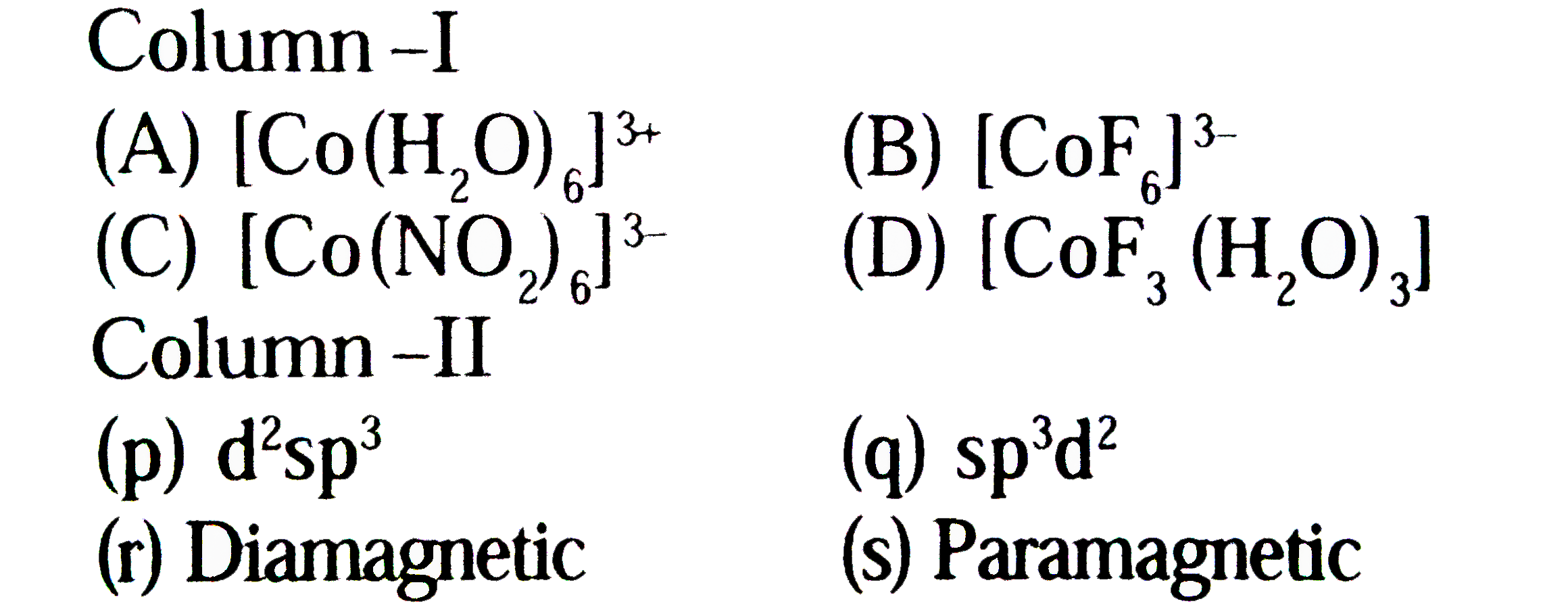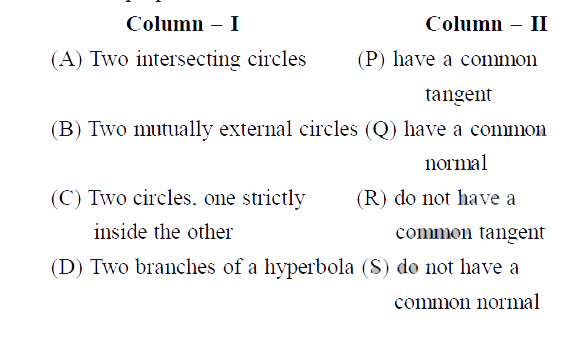Match the complexes in Column - I with their properties listed in Column - II.
 Solution in Telugu
Solution in Telugu
The correct Answer is:A, B, C, D
CN− and NH3 are strong field ligands and cause electronic rearrangements H2O is a weak field ligand and does not cause electronic regrouping.
Topper's Solved these Questions
- CO-ORDINATION COMPOUNDSBOOK - AAKASH SERIESCHAPTER - CO-ORDINATION COMPOUNDSEXERCISE - LEVEL-II EXERCISE-IV (Integer answer type Questions)
8 Videos
- CO-ORDINATION COMPOUNDSBOOK - AAKASH SERIESCHAPTER - CO-ORDINATION COMPOUNDSEXERCISE - PRACTICE SHEET - 1 (Single or more than one option questions General:)
16 Videos
- CO-ORDINATION COMPOUNDSBOOK - AAKASH SERIESCHAPTER - CO-ORDINATION COMPOUNDSEXERCISE - LEVEL-II LECTURE SHEET EXERCISE-II (Linked Comprehension type questions ) Passage-VI
3 Videos
- CHEMISTRY IN EVERYDAY LIFE BOOK - AAKASH SERIESCHAPTER - CHEMISTRY IN EVERYDAY LIFE EXERCISE - PRACTICE SHEET - 2 (PRACTICE SHEET -2 (INTEGER ANSWER TYPE QUESTIONS))
7 Videos
- COMPLEX COMPOUNDS BOOK - AAKASH SERIESCHAPTER - COMPLEX COMPOUNDS EXERCISE - PRACTICE EXERCISE
45 Videos
Similar Questions
How many EDTA molecules are required to make an octahedral complex with a Co2+ ion ?
View SolutionThe pair in which both species have iron is
View SolutionThe d-orbitals participating in hybridisation of metal atom may be from the n & (n-1) shell. This depends on the nature of metal and nature of ligand. The complexes involving the inner d-level (inner orbital complexes) results when the ligand is a powerful (or) strong ligand results in a diamagnetic (or) low spin complexes. A weak ligand usually results in the formation of outer orbital complex (or) high spin complex.
The hybridisation of Cu in [CuCl4]2−&[Cu(NH3)4]2+ are respectivly
View SolutionOne mole Benzene in presence of light on reaction with 'x' moles of Cl2 forms B.H.C. what is 'x' ?
View SolutionThe primary and secondary valencies of the central metal ion in the complex [Co(NH3)6]Cl3 respectively are
View SolutionMatch the complexes in Column I with their properties listed in Column II
View SolutionMatch the extraction processes listed in column I with metals listed in column II.

View SolutionMatch the complexes listed in column-I with characteristic(s) listed in column-II.
View SolutionMatch the complexes listed in column-I with characteristic (s)/type hybridisation listed in column-II.

View SolutionMatch the complexes listed in column-I with characteristic (s)/type of bridisation listed in column -II
View SolutionMatch the complexes listed in colmn-I with type hybridisation listed in column-II.
View SolutionMatch the pairs of complexes/compounds listed in column(I) with the characteristic(s) of the reaction products listed in column(II). .
View SolutionMatch the complexes in Column-I with their properties listed in Column-II
View SolutionMatch the statements in Column I with the properties in Column II. A

View SolutionColumn I lists some properties of waves and Column II lists the factors on which they depend . Match the entries in Column I with those in Column II.
View Solution
